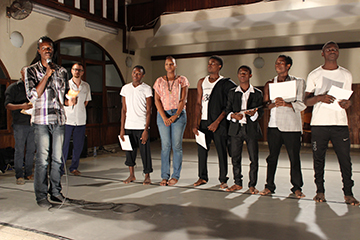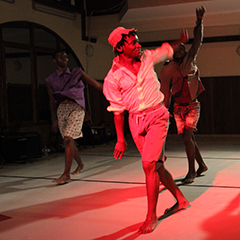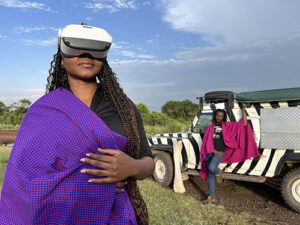 ‘Serengeti shall not die!’ Bernhard Grzimek’s message continues to shape West Germany’s image of Africa to this day. In Ultimate Safari, Flinn Works (Berlin) and Asedeva (Dar es Salaam) take a 360° look at wildlife conservation and tourism in Tanzania. National parks and wildlife protection are widely regarded as entirely good achievements. But their origins lie in violent colonial appropriation. Safari tourism is the main source of income for several African countries, while at the same time most national parks exclude the local population, depriving them of their livelihood. High-tech equipment and armed rangers are an effective tool against illegal ivory trade and poaching, but life-threatening for nomadic pastoralists or farmers. Trophy hunting by white hunters is still considered a viable funding model for protected areas. Donor-funded conservation NGOs step in where government agencies fail, but they also serve as a business model and disrupt established local forms of conservation. The ensemble of Tanzanian and German performers and changing experts lead the audience as safari guides through the multi-perspective journey. Oscillating between performance, lecture and immersive film scenes with virtual reality glasses, Ultimate Safari develops into the last light-hearted journey into the abysmal world of wildlife conservation.
‘Serengeti shall not die!’ Bernhard Grzimek’s message continues to shape West Germany’s image of Africa to this day. In Ultimate Safari, Flinn Works (Berlin) and Asedeva (Dar es Salaam) take a 360° look at wildlife conservation and tourism in Tanzania. National parks and wildlife protection are widely regarded as entirely good achievements. But their origins lie in violent colonial appropriation. Safari tourism is the main source of income for several African countries, while at the same time most national parks exclude the local population, depriving them of their livelihood. High-tech equipment and armed rangers are an effective tool against illegal ivory trade and poaching, but life-threatening for nomadic pastoralists or farmers. Trophy hunting by white hunters is still considered a viable funding model for protected areas. Donor-funded conservation NGOs step in where government agencies fail, but they also serve as a business model and disrupt established local forms of conservation. The ensemble of Tanzanian and German performers and changing experts lead the audience as safari guides through the multi-perspective journey. Oscillating between performance, lecture and immersive film scenes with virtual reality glasses, Ultimate Safari develops into the last light-hearted journey into the abysmal world of wildlife conservation.
A performance by: Isack Abeneko (performance und choreography), Susana Alonso (light design), Lea Dietrich (stage and costume design), Konradin Kunze (performance and artistic direction), Happiness Majige (performance), Andi Otto (sound design), Jürgen Salzmann (video / VR design), Sophia Stepf (direction) // Marit Buchmeier / xplusdrei Produktionsbüro (management Flinn Works), Grischa Schwiegk / Drittmittelproduktionen (production management), Gabriel Orio (organisation Tansania) // Mordecai Ogada, Laibor Moko, Simone Schlindwein, Bernhard Gißibl (consultation)
A Flinn Works Production in collaboration with Asedeva
Funded by Senatsverwaltung für Kultur und Europa des Landes Berlin, Fonds Darstellende Künste aus Mitteln der Beauftragten der Bundesregierung für Kultur und Medien im Rahmen von NEUSTART KULTUR, Between Bridges
In Cooperation mit TD Berlin
Shows
Opening: June 29, 2023, TD Berlin
Shows: June 30 – July 2, TD Berlin // July 6 – 8, Theater der Welt, Frankfurt a.M
![]() SANAAPRO project under French embassy in Tanzania is designed project to be implemented for 2 years in 2022-2023 for the aim to advance the creative sector in Tanzania and to professionalized and structured the Tanzania cultural institutions in field of music, dance and audiovisual. This project implemented by ASEDEVA in Tanzania Main land.
SANAAPRO project under French embassy in Tanzania is designed project to be implemented for 2 years in 2022-2023 for the aim to advance the creative sector in Tanzania and to professionalized and structured the Tanzania cultural institutions in field of music, dance and audiovisual. This project implemented by ASEDEVA in Tanzania Main land.
VINYAGO combines exhibition, dance, music and video art to create a room-filling installation. At the centre are EastAfrican masks from the Ethnologisches Museum
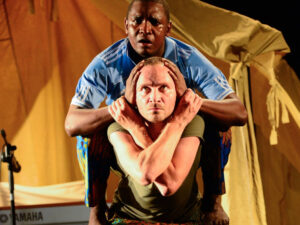 Maji Maji Flava is a collaboration between Flinn Works (Kassel/Berlin) and Asedeva (Dar es Salaam) which takes the MAJI MAJI WAR (1905 – 1907) of Tanzanian resistance against German colonial rule as its point of departure. From this shared historical event – that is perceived completely different in the two countries – the team will start an exploration of different themes: What are the perspectives on the Maji Maji War today? How can we represent this war that is at the same time myth, legend, taboo and historical event? How can we integrate different perspectives into one performance? How can we create a co-production that speaks to both Tanzanian and German audiences?
Maji Maji Flava is a collaboration between Flinn Works (Kassel/Berlin) and Asedeva (Dar es Salaam) which takes the MAJI MAJI WAR (1905 – 1907) of Tanzanian resistance against German colonial rule as its point of departure. From this shared historical event – that is perceived completely different in the two countries – the team will start an exploration of different themes: What are the perspectives on the Maji Maji War today? How can we represent this war that is at the same time myth, legend, taboo and historical event? How can we integrate different perspectives into one performance? How can we create a co-production that speaks to both Tanzanian and German audiences?
The artists and performers creating this work have radically different artistic, cultural and geopolitical perspectives. These perspectives will not be glossed over but rather sharpened into focus, driving the artistic process. Instead of seeking compromise, the project invites this clash of juxtaposing contemporary viewpoints on a shared historical event and its effects on today. Exoticism will be deconstructed, cultural stereotypes and opposing perspectives will be examined and performatively articulated. Maji Maji Flava will create an imaginative and generative artistic space in which language slips between German, Swahili and English, abstract theatre clashes with driving rhythms, magic confounds science, and contemporary dance co-exists with satire.
MAJI MAJI FLAVA – Teaser from Flinn Works on Vimeo.
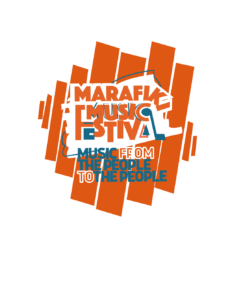 Marafiki Music Festival is the fastest growing East Africa live music festival that brings local and international artists to showcase their music (100% live), offer music education via professional workshop training, celebrate culture diversity and connect through music. This festival is curated we ASEDEVA in cooperation with Weka Music. Read more
Marafiki Music Festival is the fastest growing East Africa live music festival that brings local and international artists to showcase their music (100% live), offer music education via professional workshop training, celebrate culture diversity and connect through music. This festival is curated we ASEDEVA in cooperation with Weka Music. Read more
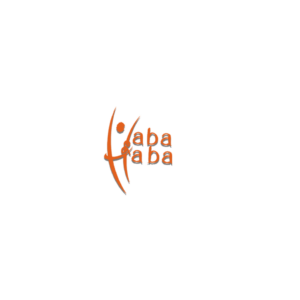 Tab Content
Tab Content
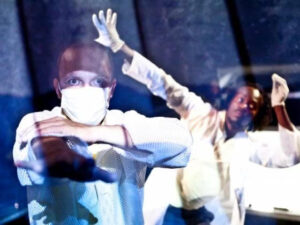 “We can eradicate malaria – within a generation” says Bill Gates. Humans discovered a cure for malaria 400 years ago and yet up to a million people die from the bite of a mosquito every year. Why is that? Inspired by debates about disease, medicine and belief systems, Flinn Works (Berlin) and Asedeva (Dar es Salaam) explore the unequal world of malaria in a theatre-science lab. Clinical studies oscillate with historical reenactments, scientific choreographies and TED talks.
“We can eradicate malaria – within a generation” says Bill Gates. Humans discovered a cure for malaria 400 years ago and yet up to a million people die from the bite of a mosquito every year. Why is that? Inspired by debates about disease, medicine and belief systems, Flinn Works (Berlin) and Asedeva (Dar es Salaam) explore the unequal world of malaria in a theatre-science lab. Clinical studies oscillate with historical reenactments, scientific choreographies and TED talks.
The audience is confronted with the conflicting politics of malaria research and treatment: after being infected, how would you like to be cured, by the latest drug from Switzerland, Chinese herbal tea or a traditional Tanzanian healing ritual? Would you rather wear mosquito-repellent sandals, drink gin and tonics or eradicate malaria with genetically modified mosquitoes? Drawing from individual experiences and research, the performance becomes a headspin of a journey through decades and continents, creating an atmosphere alternating between high-tech lab, village square and fever dream.
Devised and Performed by: Isack Peter Abeneko & Konradin Kunze
Direction: Sophia Stepf
Stage and Costume Design: Léa Dietrich
Video Design: Jürgen Salzmann
Sound Design: Andi Otto
Consultant: Caroline Meier zu Biesen
Assistant Director: Alice Harrison
Assistant: Eric Ndikumana
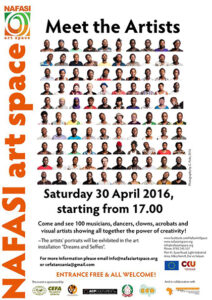 The project was organized by CEFA and Vijana Vipaji Foundation (VVF) in collaboration with ASEDEVA. The event was the final performance of “Art Against Poverty” project.
The project was organized by CEFA and Vijana Vipaji Foundation (VVF) in collaboration with ASEDEVA. The event was the final performance of “Art Against Poverty” project.
This was an assembly performance, reflecting the Art Against Poverty (AAP) by CEFA and VVF that showed the results of the work of local artists who participated in the AAP project. Subsequent, the 2 years of local artist receiving an effective training & performance to act against poverty in different aspect of art.
Isack Peter Abeneko
Meet the Artist performance was a collective process of creating together a live performance that brought together different artists with different skills which they had obtained in AAP. Art connects people, allows us to envision possibilities and bridges differences. Art can be inclusive of all people in society and empowers civil society. Cultural productions are powerful vehicles for freedom of expression and development of democracy. “It is time to share and show what we have received, what we have learnt, what have been improved’’ said by Aloyce Funga Funga one of the artist benefitting from AAP.
The creating together performance presented in this event was the result of the AAP project conscientious work in identifying talents and skills of our local artists from different parts of the country. It illustrates their multiplicity and their creativity that they have received through the Art Against Poverty project for 2 years

This production is a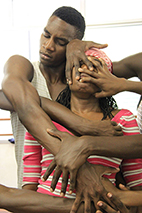
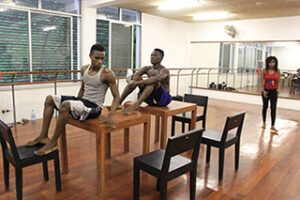 joint project between ASADEVA and the National Museum and House of Culture (NMHOC) under the Swedish Institute (SI) funded project, Art and Culture for Democracy. The project is a collaboration between NMHOC and The Swedish Friends of the Museum and House of Culture.
joint project between ASADEVA and the National Museum and House of Culture (NMHOC) under the Swedish Institute (SI) funded project, Art and Culture for Democracy. The project is a collaboration between NMHOC and The Swedish Friends of the Museum and House of Culture.


The Haba na Haba Contemporary Dance Training Program is a series of training workshops, held annually, that offer high-quality training in various techniques of contemporary dance to Tanzanian dancers (including youths and women). More than that, Haba na Haba is a networking opportunity that exposes its participants to life-skills and professional skills that build confidence in their art form and enable them to better their employment opportunities. The focus of the workshop is on Contemporary dance and exploring how this relatively new art form relates to Traditional Tanzanian dance forms.
